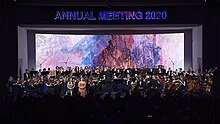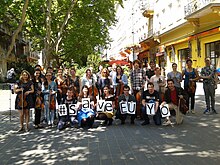| European Union Youth Orchestra | |
|---|---|
| Youth orchestra | |
 | |
| Founded | 1976 |
| Location | Grafenegg, Austria |
| Principal conductor | Iván Fischer |
| Website | www |

The European Union Youth Orchestra (EUYO) is a youth orchestra with members drawn from the 27 members states of the European Union. Since its foundation in 1976, it has connected music colleges and the professional music world for generations of European musicians. EUYO is considered one of the best youth orchestras in the world, achieving "extraordinarily high standards" and playing at all major European festivals, including the Proms, the Salzburg Festival, and Young Euro Classic.
EUYO is an associated member of the European Federation of National Youth Orchestras and is supported by the Creative Europe programme.
Activities
| External videos | |
|---|---|
| Performances of the European Union Youth Orchestra, conducted by Vasily Petrenko | |
EUYO is open to all EU citizens between the ages of 16 and 26 for audition. Each year, it recruits around 120 members and 120 reserves from around 2,000 to 3,000 auditionees. Members spend 2–3 years in the orchestra on average, and over 90% of its former members have become professional musicians.
EUYO organizes spring and summer residencies every year, each followed by a tour. The spring residency begins with a 2–3 week residency at the orchestra's base in Ferrara. The summer residencies are based in Grafenegg and Bolzano and begin with a 3-week rehearsal period.
History
EUYO was founded by Joy and Lionel Bryer in 1976 as the European Community Youth Orchestra (ECYO), following a resolution adopted by the European Parliament. Claudio Abbado served as the orchestra's founding director.
In 1994, the orchestra was renamed European Union Youth Orchestra (EUYO), following the Maastricht Treaty that established the European Union. By 2013, the orchestra had performed in every country of the European Union.
In 2014, EUYO launched the Towards 2020 (T2020) project, aiming to change the face of classical music in Europe by training young musicians to engage with 21st century audiences.
Imminent closure

On 12 May 2016, EUYO announced that was to cease operations from September 2016 due to a lack of future funding from the European Union. However, the news attracted extensive support around Europe, where campaigns and flash mobs took place and many conductors and artists including Antonio Pappano, Gustavo Dudamel and Daniel Barenboim put their names to a statement supporting the Orchestra's work. On 31 May 2016, an official press announcement from the Council of Ministers and European Commission confirmed that Commission President Jean-Claude Juncker had ordered three commissioners to find funding for EUYO. On 1 June 2016, Juncker announced a proposal to enable the European Union to return EUYO to core funding.
Brexit and Relocation to Italy
The orchestra announced in October 2017 that, as a result of Brexit, it intended to relocate from London to Italy. Since the expiration of the Brexit transition period on 31 December 2020, members from the United Kingdom are no longer eligible to apply.
In 2018, EUYO relocated to Ferrara, Italy. The orchestra's headquarters were then housed in the Teatro Comunale Claudio Abbado, an opera house located in the heart of the city.
Relocation to Austria
On 5 December 2022, the orchestra announced that it would move its administrative home to Grafenegg and Vienna, Austria, from the beginning of 2023.
People
Since the orchestra's inception, there have been five principal conductors:
- Claudio Abbado (1976–1994)
- Bernard Haitink (1994–2000)
- Vladimir Ashkenazy (2000–2015)
- Vasily Petrenko (2015–2024)
- Iván Fischer (2024–present)
Assistant conductors have included James Judd.
EUYO has also worked with guest conductors including Daniel Barenboim, Leonard Bernstein, Herbert Blomstedt, James Conlon, Colin Davis, Antal Doráti, Carlo Maria Giulini, Herbert von Karajan, Rafael Kubelík, Erich Leinsdorf, Lorin Maazel, Zubin Mehta, Gianandrea Noseda, Kurt Sanderling, Gennady Rozhdestvensky, Mstislav Rostropovich and Georg Solti.
Soloists that have appeared with EUYO include pianists Martha Argerich, Vladimir Ashkenazy, Emanuel Ax, Evgeny Kissin, Radu Lupu, Julian Lloyd Webber, Murray Perahia, Maria João Pires, Mikhail Pletnev, Maurizio Pollini, violinists Itzhak Perlman, Renaud Capuçon, Kyung Wha Chung, Janine Jansen, Leonidas Kavakos, Daniel Hope, Nigel Kennedy, Yehudi Menuhin, Midori, Viktoria Mullova, Anne-Sophie Mutter, Arabella Steinbacher, Pinchas Zukerman, and singers Diana Damrau, Plácido Domingo, Dietrich Fischer-Dieskau, Angela Gheorghiu, Matthias Goerne, Susan Graham, Christa Ludwig, and Jessye Norman.
Reception
EUYO is considered one of the best youth orchestras in the world, consistently receiving critical acclaim for its performances. In 2012, The New York Times noted that an EUYO concert at Carnegie Hall was "nearly indistinguishable from what any fine orchestra out to make an impression at Carnegie Hall might present", and that the orchestra proved conclusively that it was among the "elite institutions of its kind". The Financial Times called a 2014 performance at the Proms "sizzling" and at times "breathtaking". The Guardian described the EUYO as having "gripping, exhilaratingly good orchestral playing, surging with energy, laser-sharp focus and collective daring", with "a technical prowess that is downright terrifying". Bachtrack called EUYO a "wonderful celebration of music, friendship and European unity". The Times has called EUYO "the cream of Europe's talent", and that "post-Brexit, this closed door for the UK will be a valuable cultural opportunity lost". The Chicago Tribune called EUYO "special", remarking that the sound had "remarkable character, strength and beauty", and that "if more concerts were performed with as much dedication and passion, maybe the audience for serious music would be growing again". The Washington Post noted that EUYO "need fear no competition."
In 2020, EUYO was chosen as the European Cultural Brand of the Year, setting "an example for the future" as the "living orchestra of the European Union".
See also
References
- As of 2021, players from the United Kingdom are no longer eligible to apply for the orchestra, though due to the COVID-19 pandemic, members of the 2020 orchestra will get re-invited in 2021.
- ^ Smith, Steve (19 April 2012). "Music in Review – European Union Youth Orchestra". The New York Times. Retrieved 16 December 2020.
- ^ Lawson, Colin (2003). The Cambridge companion to the orchestra. Cambridge, U.K.: Cambridge University Press. ISBN 0-521-80658-5. OCLC 50301467.
- European Federation of National Youth Orchestras. "Members&Partners". Retrieved 9 December 2020.
- ^ European Expert Network on Culture and Audiovisual (14 October 2017). "Assessment of the European Union Youth Orchestra (EUYO)". www.eenca.com. Retrieved 16 December 2020.
- ^ "Landmark Moments in the History of the EU and the EUYO". euyo.eu. Retrieved 16 December 2020.
- "Towards 2020: T2020". euyo.eu. Retrieved 16 December 2020.
- Marcus, Marshall (13 May 2016). "Marshall Marcus: The European Union Youth Orchestra cannot be strangled by European bureaucracy". The Guardian. Retrieved 16 December 2020.
- Wright, Katy (27 May 2016). "Save EUYO campaign attracts extensive support". Rhinegold Publishing. Retrieved 16 December 2020.
- "EU brings youth orchestra back from the brink". Deutsche Welle. 2 June 2016. Retrieved 16 December 2020.
- Brown, Mark (11 October 2017). "EU youth orchestra to quit UK for Italy over Brexit". The Guardian. London. Retrieved 11 October 2017.
- "EUYO: Frequently Asked Questions". euyo.eu. Retrieved 9 January 2021.
- "EUYO: Contact information". euyo.eu. Retrieved 28 September 2019.
- "EUYO announces a new home in Austria". www.euyo.eu. Retrieved 6 December 2022.
- "Iván Fischer appointed as Music Director of the European Union Youth Orchestra" (Press release). European Union Youth Orchestra. 10 July 2024. Retrieved 12 July 2024.
- Houlahan, Mike (April–June 1999). "Welcoming James Judd". Symphony Quarterly. 20: 4–5.
- "European Union Youth Orchestra Concert History 1978–1993 with Claudio Abbado". ne.jp. Retrieved 22 December 2020.
- Nepil, Hannah (6 August 2014). "BBC Proms: European Union Youth Orchestra, Royal Albert Hall, London – review". Financial Times. Retrieved 16 December 2020.
- Molleson, Kate (26 August 2015). "EUYO Noseda at Edinburgh festival review – extraordinary energy and technical prowess". The Guardian. ISSN 0261-3077. Retrieved 8 February 2016.
- Shuttleworth, Jane (20 August 2016). "The European Union Youth Orchestra triumphs in Bolzano". Bachtrack. Retrieved 16 December 2020.
- Franks, Rebecca. "Prom 49 review: European Union Youth Orchestra/Gianandrea Noseda at the Royal Albert Hall". The Times. Retrieved 22 December 2020.
- Alan G. Artner (25 April 2012). "Students and stars collaborate in a special effort with Vladimir Ashkenazy, Northwestern". Chicago Tribune. Retrieved 21 December 2020.
- Banno, Joe (16 April 2012). "Concert review: European Union Youth Orchestra at the Kennedy Center". The Washington Post. Retrieved 22 December 2020.
- Boutsko, Anastassia (26 November 2020). "European Union Youth Orchestra ist Kulturmarke des Jahres 2020". Deutsche Welle (in German). Retrieved 10 January 2021.
| National youth orchestras | |
|---|---|
| Africa | |
| Asia | |
| Oceania | |
| Europe | |
| Americas | |